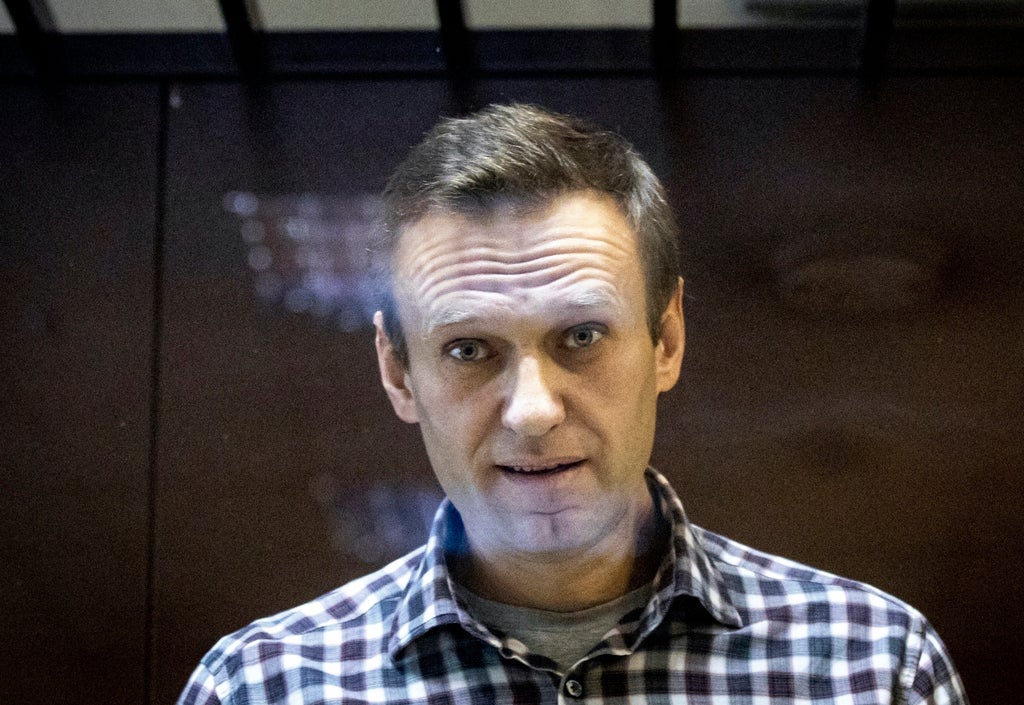
Imprisoned Russian opposition leader Alexei Navalny stepped abruptly into France’s tight presidential campaign Wednesday, urging voters to back incumbent Emmanuel Macron and alleging that far-right challenger Marine Le Pen is too closely linked to Russia.
Le Pen has faced scrutiny before over a 9 million euro loan that her party received in 2014 from the First Czech-Russian Bank.
Questions about Le Pen's ties to Moscow arose during her presidential bid five years ago that she lost to Macron and they have emerged again amid Russian President Vladimir Putin's war in Ukraine. She noted she has condemned the Feb. 24 invasion “without ambiguity.”
The tweet by Navalny’s team, hours before a final debate between the two candidates, threatened Le Pen’s relatively smooth ride toward Sunday's runoff against Macron..
At the debate, Macron attacked Le Pen as being dependent on Russia, which he described as “your banker.”
Le Pen bristled at the suggestion she is beholden to the Kremlin, saying she was “totally free.”
Earlier in the campaign, she had dismissed questions about the loan to her National Front party, which has been rebranded as the National Rally. The bank has since been dissolved.
Navalny, who is Putin’s chief domestic foe, said in the long thread in French that he wanted to tell Le Pen's supporters about corruption in Russia and how it has tainted banks like the FCRB.
“This bank is a well-known money-laundering agency created at the instigation of Putin,” Navalny tweeted, although he did not cite any evidence other than cite his own investigations into corruption in Russia. “This is selling political influence to Putin.”
A 2019 study by the Washington-based Alliance for Securing Democracy at the German Marshall Fund found that the FCRB bank had been a “a key cog in Moscow’s attempt to swing political contests overseas — and how this bank sought to use existing campaign finance loopholes to achieve political objectives.”
Le Pen’s anti-immigration party was a focus of the study, saying the bank had been involved in being a “vehicle for money-laundering by corrupt elites on a massive scale.” It also cited “Russian state-sanctioned interference in the Western political system" in the form of the loan to the National Front.
Le Pen has said her party went to the FCRB after French and European banks refused to lend it money. The loan has dogged the far-right party for years, along with her ties to Putin. A photo of the two meeting in 2017 has been posted on social media by her opponents during the campaign.
At a news conference before Navalny’s tweets, Le Pen again defended herself against suspicions of being beholden to the Kremlin. She told reporters earlier this month that she doesn’t believe the FCRB was under the orders of Russian leaders.
She added that her party is still paying off the loan, without clarifying who the creditors are.
She said the loan was no sweetheart deal.
“This loan didn’t come with a friendly interest rate. It was signed at 6%,” she said.
“I am, of course, available for any bank, American, from South America, that would want to take over this loan,” she said.
In a dig at the French banking establishment, she added: “If a French bank wants to buy this loan, it would, of course, be at the same conditions, very advantageous terms for the bank.”
French law now forbids loans to political parties from non-European Union countries, and Le Pen’s National Rally party has taken out a loan from a bank in Hungary, headed by Viktor Orban, a Le Pen ally.
Navalny last month was sentenced to nine years in prison on fraud and contempt of court charges top of a 2½-year sentence for what he says are politically motivated convictions. The 45-year-old activist, who is imprisoned in a penal colony east of Moscow, in 2020 survived a poisoning with a nerve agent that he blames on the Kremlin.
Over the past year, Putin has cracked down on opposition figures like Navalny, along with his supporters, other activists and independent journalists in a bid to stifle all dissent.
Navalny’s team has stepped up efforts to put international pressure on Putin, speaking at EU venues and calling for sanctions against Moscow.
Russia has for generations held a fascination for the Le Pen family, starting with Jean-Marie Le Pen, Marine’s father and co-founder of the old National Front. Marine Le Pen’s niece, Marion Marechal, a far-right politician, has visited Russia and Marine Le Pen has visited Russia several times, but only once met with Putin.







